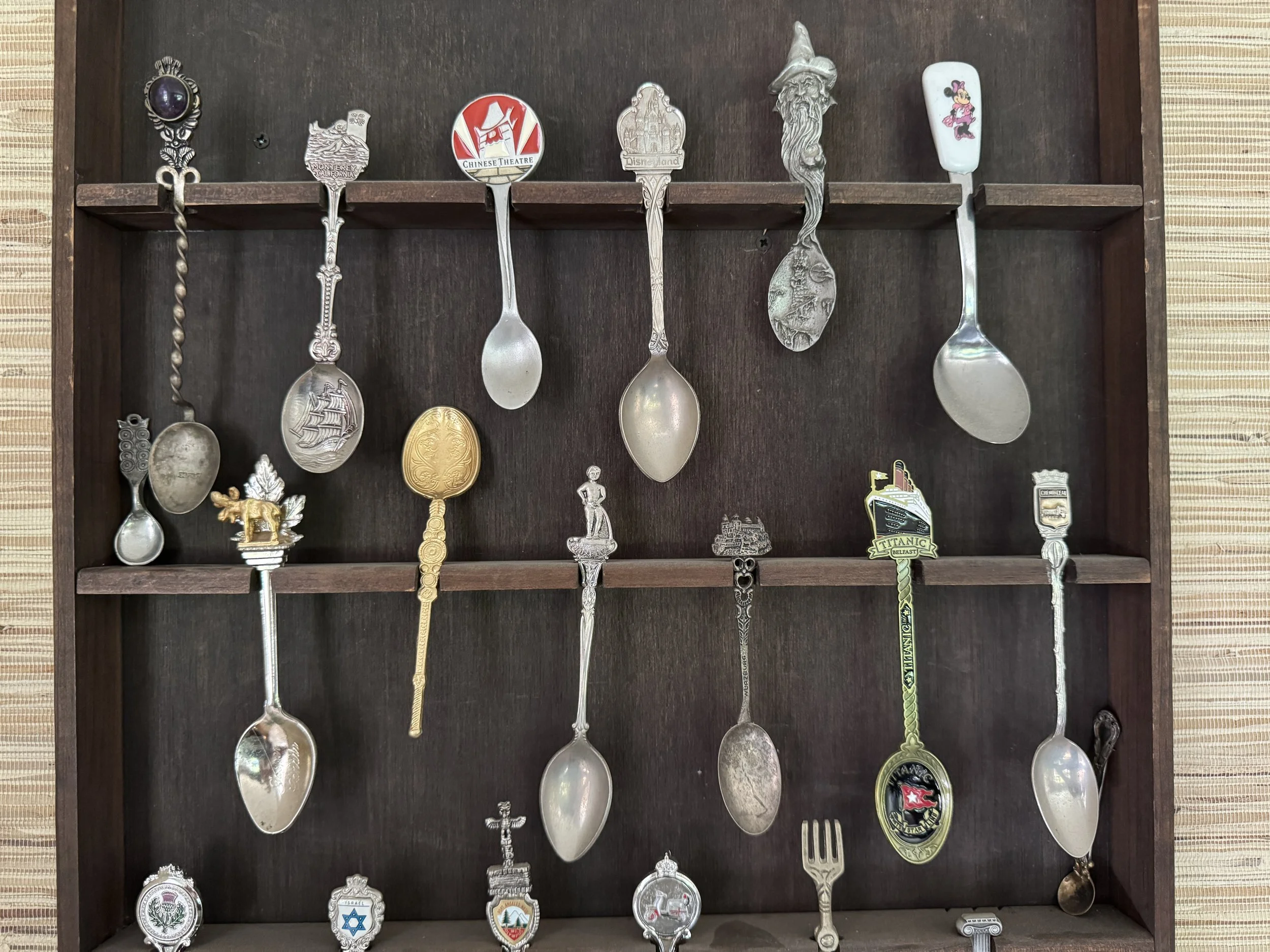5 surprising health benefits of having a mom-hobby (a mobby?)
My grandfather built me this spoon rack out of old barn wood. My very first spoon is located top right corner.
I was the only kid with a hobby generally reserved for grandmas: collecting spoons.
My mom’s friend gave me my first spoon when I was six. It was from Disneyland and had the cutest picture of Minnie Mouse on the handle. I loved it.
We didn’t travel to many far away places but I did look for a spoon wherever we went. Marine World, a State Park, the zoo, a random gas station.
In time my collection grew as I got older and traveled more, and my friends and family also learned of my hobby and would bring me back a spoon gift from their travels.
Eventually I had enough where my grandfather built me 3 spoon racks from old barn wood so I could proudly display them. Can you imagine it, spoon racks on a teenager’s purple bedroom walls?
It makes me laugh to think about my hobby as a kid because the response I usually got from friends who saw my room was, “you collect…spoons?” I’d reply, “yes, kinda weird I know.”
While I constrain myself to one rack in the dining room now, I sometimes rotate them out and tell my kids stories about where they came from. A recent highlight was when my niece brought me back spoons from a trip to the UK. I was so pleased she thought of me during her trip!
What hobby did you have as a kid? Are you still into it now?
Hobbies are more rewarding than just having something fun to display. Research has shown that having a hobby can improve your mood, lower stress, and even increase longevity. Doing activities you find enjoyable lowers stress hormones and helps regulate the nervous system. Two things that have a powerful impact on your health.
Activities that specifically use your hands can lower anxiety by activating the reward system in your brain and again, lowering stress hormones. Any knitters or crocheters in the house?
Fall is the perfect time of year to dig out your forgotten hobbies (I’ll be crocheting one of these blankets while the leaves are changing color), or pick up something new.
I forgot about many of my hobbies when my kids were young and I wasn’t taking that good of care of myself. I’ve talked with many fellow nurses and mommas who say they’d love to get back into the activities they love, but they keep putting that on the back burner.
I wonder what would happen to the health of all the mommas out there if we felt the pressure of “doing it all" just release, and gave ourselves a little time for our mobbies. The studies show the benefits to our health could be profound.
Health benefits of having a hobby
Reduction in all-cause mortality risk (1)
This one is quite shocking! A study across 19 countries showed that having a hobby was associated with a 29% decrease in all-cause mortality, which means death due to any cause. I raise my crochet hook to this one.
Fewer symptoms of depression and increased levels of happiness (2)
Activities such as volunteering and hanging out in nature have been shown to be protective against depressive symptoms, and improve participants' self-reported levels of happiness.
Provide relief from anxiety (3)
Many of us working moms experience occasional if not daily moments of anxiety. Remember that: anxiety is not something we have, it’s something we experience like any other emotion.
This benefit of calming anxiety is especially profound when you find a hobby that works with your hands, such as gardening, cooking, crafting or playing an instrument. Working with your hands brings you into the present moment and can lift your mood without focusing on your worries. These types of hobbies help you relax and feel more calm. And a calm momma helps foster the environment for calm kiddos, too.
Improves cognitive function (4)
A study in Japan found that participants who had a hobby had a lower risk of developing dementia. And, the risk decreased as the number of hobbies increased. These findings are truly amazing to me. Learning about brain health and risk factors contributing to dementia are near and dear to my heart. I find it very encouraging that there are lifestyle factors we can control that contribute to our brain health and aging.
Increase in life satisfaction (5)
This one just makes sense to me even without scientific research to back it up. Engaging in something we find enjoyable and fun will for sure add to how we experience this one life. And if your hobby happens to be a social one, you’ll experience all the benefits of the connection hormones, too!
Making time for hobbies
I can hear you now, “but Sarah, where do I find the time?”
This is always the question, and one I struggle with too. I put my own needs on the backburner for so long that I felt weird, selfish and uncomfortable when I started “taking up time from the family” doing things like reading, crocheting and going for long walks.
But I will say, the more often I felt those uncomfortable feelings of selfishness and guilt for doing something for myself, but still did the enjoyable thing anyway, the easier it got. I felt guilty, but sat on the couch to read anyway.
Now, I no longer feel guilty when I work on a mobby while the house is a mess. I truly believe that just because I take time for self-care doesn’t mean I’m taking time away from my family or my job. We can fit both roles of caring for ourselves and caring for others into our lives.
I know that I become increasingly irritable when stress builds up, so for my own mental health I need to take breaks.
Here are some tools you can use to help you go from feeling guilty about self-care, to feeling OK about doing something non-kid or house related.
Acknowledge the thoughts creating your negative feelings about self-care, resting, or indulging in a mobby. Then, reframe those thoughts to something more powerful that serves you instead of makes you feel defeated
For example, if you have thoughts such as, “I don’t have time for this” tell your brain, “OK that thought can pass on through. I am creating time for my inner health, and that’s OK”
Talk with your spouse and kids about what you are experiencing. Tell them how you are feeling and show them what it’s like to be an adult who is self-aware about their own feelings, and wanting to care for one' s health. Think of the model you are setting, especially if you have daughters!
After you talk with the family, ask them if they have any ideas about how everyone, momma included, can have enough time for hobbies. You might be surprised by what the kids come up with.
Put “mobby time” on your calendar: schedule in your mobby or self-care time in advance and don’t back out on yourself! You create time for what you prioritize. We all do.
Stack your mobby with something else: can you read while your kids read their school books? Can you walk around the park where your kid has soccer practice? Can you crochet while hanging outside with the kids? Can you put on some music that makes you smile while you’re all cleaning the kitchen?
Try to find little pockets of time where you are already committed to something else, and pair it with a stress-lowering mobby.
Where to start
Do you already have a hobby you used to love but have let it fall off? Pick it back up. Reading, gardening, cooking, are all considered great mobbies, too. As long as you find them enjoyable and relaxing.
If you don’t really know what you’d like to have as a mobby, start with daily walks. Walking is the number one hobby we can all have. Is it a hobby or an activity? I don’t know what to call it, but walking does wonders for our health.
The thing that’s important is to start today. Give yourself permission to rest in your mind and rest in your body while doing a fun mobby.
Whatever you find enjoyable, your lowered stress hormones will thank you for it. Have fun.
If you’d like more tips and tools about coping with stress so you can carry on caring for those you love with calm, check out my health newsletter. I’d love to connect with you there and hear about your health goals!


